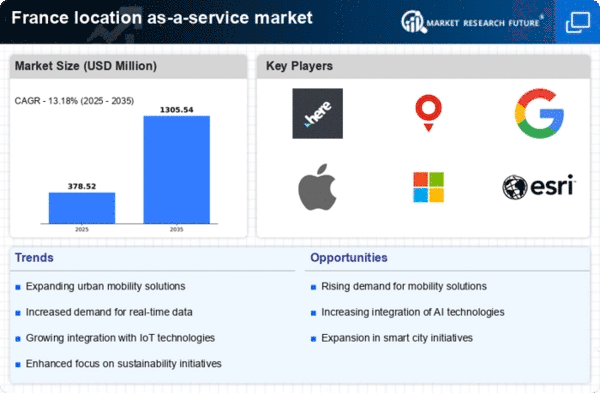Rising Demand for Real-Time Data
The location as-a-service market in France experiences a notable surge in demand for real-time data analytics. Businesses increasingly seek to leverage location-based insights to enhance operational efficiency and customer engagement. This trend is particularly evident in sectors such as retail and logistics, where timely information can lead to improved decision-making. According to recent statistics, the market for real-time data solutions is projected to grow by approximately 25% annually, indicating a robust appetite for location intelligence. Companies are investing in advanced technologies to harness this data, thereby driving the location as-a-service market forward. Integrating real-time data into business strategies optimizes resource allocation. It also fosters a competitive edge in the marketplace.
Advancements in Mobile Technology
Advancements in mobile technology are significantly impacting the location as-a-service market in France. The proliferation of smartphones and mobile applications has created new opportunities for businesses to engage with customers through location-based services. As mobile penetration in France reaches approximately 90%, companies are increasingly leveraging mobile platforms to deliver personalized experiences. This trend is likely to enhance customer loyalty and drive sales, as consumers respond positively to tailored offerings based on their locations. Furthermore, the integration of augmented reality and geolocation features into mobile applications is expected to further stimulate the location as-a-service market, providing innovative ways for businesses to connect with their audiences.
Expansion of Smart City Initiatives
The development of smart city initiatives across France significantly influences the location as-a-service market. Urban areas are increasingly adopting technologies that enhance connectivity and improve public services. This shift is expected to create a demand for location-based services that facilitate efficient urban planning and management. For instance, the French government has allocated over €1 billion towards smart city projects, which include the implementation of IoT devices and data analytics platforms. Such investments are likely to bolster the location as-a-service market, as municipalities seek innovative solutions to address urban challenges. The integration of location services into smart city frameworks can lead to enhanced public safety, improved transportation systems, and better resource management.
Growth of E-Commerce and Delivery Services
The rapid expansion of e-commerce and delivery services in France drives the location as-a-service market. As online shopping continues to gain traction, businesses are increasingly reliant on location-based services to optimize logistics and enhance customer experiences. The e-commerce sector in France is projected to reach €100 billion by 2025, with a significant portion attributed to the demand for efficient delivery solutions. Companies are utilizing location intelligence to streamline supply chains, reduce delivery times, and improve customer satisfaction. This trend underscores the importance of location services in meeting the evolving needs of consumers and businesses alike, thereby propelling the growth of the location as-a-service market.
Increased Focus on Environmental Sustainability
The location as-a-service market in France is also shaped by a growing emphasis on environmental sustainability. Businesses are increasingly recognizing the importance of reducing their carbon footprints and optimizing resource usage. Location-based services can play a pivotal role in achieving these sustainability goals by enabling more efficient routing, reducing fuel consumption, and minimizing waste. For instance, companies that utilize location intelligence for fleet management can potentially decrease their emissions by up to 20%. This alignment with sustainability objectives not only enhances corporate responsibility but also appeals to environmentally conscious consumers, thereby driving demand for location as-a-service solutions.
















